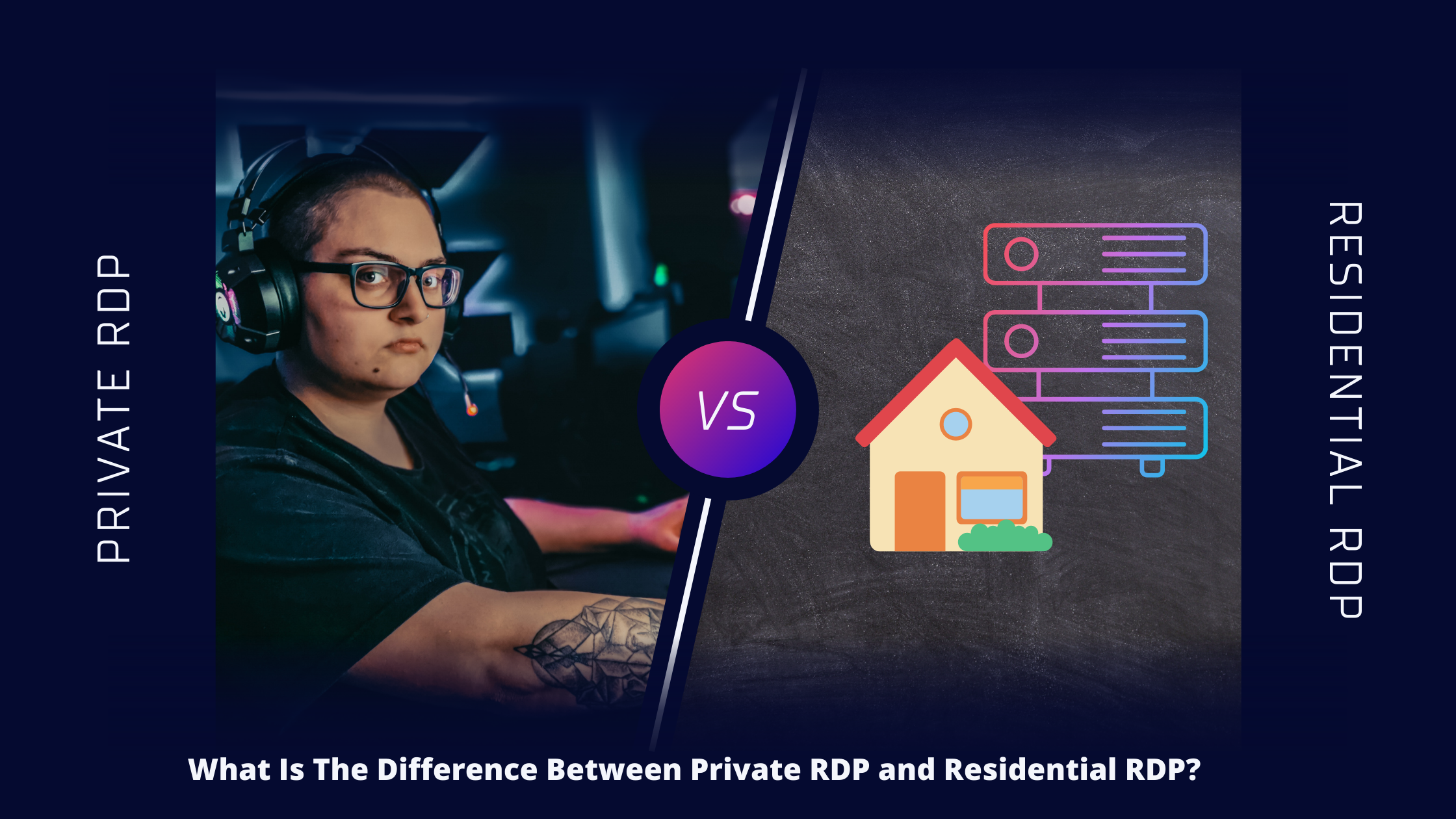
Read this article to know, ‘What Is The Difference Between Private RDP and Residential RDP?’. Access to a computer or server can be done remotely via RDP (Remote Desktop Protocol). It serves as a point of entry into a distant system. Remote Desktop Protocol (RDP) is mostly used for remote management and administration. It can also be used to manage “headless computers,” those without a monitor, keyboard, mouse, or other primary I/O gadgets.
Remote desktop protocol server providers have a variety of remote desktop protocol servers. Private RDP and Residential RDP are two of those. The difference between private RDP and Residential RDP is mentioned in detail in this article.
When looking to buy RDP, the options of Private RDP vs. Residential RDP are frequently discussed. When the additional advantages of a remote desktop protocol are discussed, it is also a discussion topic. In Microsoft Windows, the remote desktop protocol is a proprietary protocol created by Microsoft to provide remote access.
Access is gained through the use of TCP port 3389. When a client connects to a server using the remote desktop protocol, it sends a keyboard/mouse combination, as well as display and data, to the server.
For a server to function properly, it requires numerous resources and functionalities. The server’s resources and technical specs can be tailored to meet the individual needs of each client’s project. Typically, the choice of RDP kind is made at the time of buying. However, extra resources can be added if necessary.
Learning about remote desktop protocols can help you choose the right one for your needs and data transfer requirements. Depending on the services and features offered, remote desktop protocol providers classify their RDPs into various categories. In the next part, we’ll take a quick look at some of the most popular RDPs on the market.
What Is The Difference Between Private RDP and Residential RDP?
The difference between Private RDP and Residential RDP is mentioned in terms of the following parameters:

1. Technical Proficiency
Every webmaster’s skill, including maintenance and safety scans, is required while setting up a Private RDP. The developer is also responsible for configuring resources. It is necessary to restrict access based on the user’s position in the system topology.
They must use the interface to implement responsibilities and assignments, which need expertise and experience. A developer can’t anticipate any help from the service provider because Private RDP is completely under the client’s control.
A developer must manually set up a server for a Residential RDP. It is possible to select the configuration type needed with a premium Residential RDP service.
The customer can pick the type of service they want, and the provider will offer it. There are no technical skills required for a developer to successfully operate the server.
2. Root access
In both private and residential RDP, root access is granted to the user. However, because Private RDP is a server within a server, issues may develop. Dedicated server storage is provided by server companies for Residential RDP.
Access to the root of a dedicated storage device is more dependable than that of a virtual server.

3. The price of the RDP
Private RDP servers are part of the primary server, thus they don’t involve additional fees for the server businesses to add resources to their main server It’s not as if they require new supplies because they already have a good deal of them.
A Private RDP is less expensive than a Residential RDP. For example, RAM, CPU, bandwidth, storage, and IP are all included in the high price. Residential is only an option for businesses because of the associated costs.
4. Allocation of Resources
The resource allocation of a Private RDP can be increased based on the needs of the client. If the client’s company grows, the remote desktop protocol service provider has the infrastructure in place to support that growth.
Because additional resources necessitate the purchase of infrastructure, Residential RDPs may have a limited budget. Clients are frequently on the hook for the whole price of these extra services.

5. Deployment and Testing of Software
In testing and delivering software, a Private RDP is more effective than a Residential RDP. When it comes to testing and repairing software issues, a Private RDP provides the essential environment.
Private RDPs are frequently used by software developers to do beta testing. When working on a project with a small group, the ideal choice is Private RDP.
6. Bandwidth
When compared to a Residential RDP, the amount of bandwidth consumed by a Private RDP is significantly lower. Having all of the service provider’s customers connected via a single IP address or channel results in low bandwidth. The bandwidth diminishes as rises, resulting in problems for all users.
Unlimited bandwidth is included in the Residential RDP. Because of the Residential IP address and the dedicated server, infinite bandwidth is feasible.
Separate IP addresses and access channels are available for each of the firm’s client servers. There will be no impact on bandwidth no matter how much people are using it at once.

7. Connection speed
The person’s network provider determines the maximum permissible connection speed for a Private RDP. Due to the Residential IP Proxy, Residential remote desktop protocol users’ speeds can be slowed. In most cases, the Proxy of the Residential RDP does not need to be slow. Lesser speeds from a proxy can be remedied by ensuring that the remote desktop protocol provider ensures that their customers will have a good speed experience.
CONCLUSION
After reading this article, you might have got a good knowledge about, ‘what is the difference between private RDP and residential RDP?’. You can also read this article to learn about, ‘how to get cheap admin RDP that works’. Even though both RDP types have identical characteristics, their configurations differ by a minuscule margin.
An RDP’s performance is greatly impacted by its configuration, despite its small size. Residential RDP relies on its resources to run without relying on other clients of the service provider.
In particular, Private RDP’s connection speeds and software deployment capabilities are attracting the attention of companies and individuals also. Usually, the prices of residential RDP are high, but you can buy cheap Residential RDP and cheap Private RDP from amazingrdp.com.
Depending on your needs and budget, you may pick an appropriate RDP for your business. In some instances, RDP service-providing companies offer both Private RDP and Residential RDP options to their customers. In addition, they allow clients the ability to tailor their resources.
You’ll save a lot of money over the years by using an RDP that you can modify. However, if quality rather than quantity is more important to you, then a Residential RDP with a reliable proxy and a Residential IP is the better option.
You can also read this article to know more details about residential RDP.


